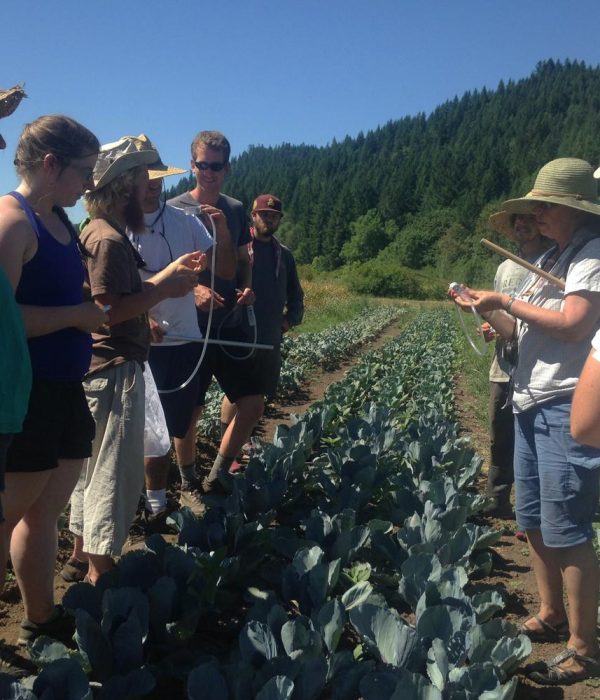A group of beginning farmers gather at Wandering Roots Farm. Photo courtesy of Rogue Farm Corps
The tidal wave of farmland transition isn’t coming – we’re in the middle of it.
by Nellie McAdams
Farm Preservation Program Director, Rogue Farm Corps
Between 2012 and 2032, about two-thirds of Oregon’s 16.3 million acres of agricultural land will change hands.* The reason? Oregon farmers and ranchers have never been older — they are approaching the retirement age for most professions, at 59.6 years on average.
What will happen to the 10.5 million acres that is sold or passed through estates is uncertain, since most farmers and ranchers don’t have a thorough succession plan and the percentage of beginning farmers and ranchers is on the decline.

A group of new farmers participates in an entomology course at Persephone Farm. Courtesy of Rogue Farm Corps
The next generation of farmers and ranchers is finding it increasingly difficult to make an agricultural business pencil out. For one, the cost of their most important asset—land—is increasing. This is partly due to growing demand for farmland from investment companies looking for stable, long-term investments; development speculators who hope the land will eventually be zoned for development; and “amenity” owners who love the view but don’t keep the land in production. Even if a beginning farmer can qualify for financing to purchase land, she might find it difficult to afford mortgage payments on her slim and uncertain margins.
Oregon’s working lands define our landscape. They grow our food, provide fish and wildlife habitat, and sustain our rural economies — supporting the state’s second largest industry. Yet agricultural land is vulnerable to being lost forever. The best farmland tends to be along river bottoms, where humans also tend to build our cities.
Development and fragmentation of agricultural land plays for keeps; once you pave paradise and put up a parking lot, farmland’s food-producing soils, open space, and natural resource values can never be restored.
Even where there are fewer development pressures, such as Eastern Oregon, ranches can be fragmented and trophy homes built on parcels much smaller than the 10,000 or more acres that it takes to support a family on ranch income alone.
But Oregon’s agricultural land is better preserved than farmland in most other states.
That’s thanks to visionary state legislation, championed in 1973 by people including Governor and rancher Tom McCall. Among other things, this legislation established tax and zoning support for Oregon’s farmers, ranchers, and the land they depend upon. The purpose, as stated by the eloquent McCall, was to prevent agricultural land from being consumed by “sagebrush subdivisions, coastal condomania, and the ravenous rampages of suburbia.” The state created a new guiding principle: that “unlimited and unregulated growth, leads inexorably to a lowered quality of life.”
While Oregon’s land use program has not stopped the loss of our irreplaceable working lands, it has slowed it. For instance, although Oregon lost 500,000 acres from agricultural production in the 40+ years between when the program was implemented and 2016, the state of Washington (which does not have as comprehensive a land use program) lost 678,606 acres from agriculture in just 10 years.
Oregon’s beautiful and productive agricultural lands and our dense, livable cities make the state a darling of the national and international stage. And we have the land use program to thank for both. However, it is ironic that the population boom that is often attributed to Portland’s livability is both the product of, and a threat to, the protections of Oregon’s land use program.

Checking on the cows at Lazy B Ranch. Courtesy of Rogue Farm Corps.
The best long-term defense for Oregon’s agricultural lands is ensuring that farming and ranching are financially viable enterprises. To support this and fill the pipeline with the next generation of agricultural entrepreneurs and land stewards, organizations around the state and nation are hard at work:
Rogue Farm Corps’ internship and apprenticeship programs offer hands-on, on-farm training in four regions of the state to build capacity in the next generation.
Ecotrust’s Ag of the Middle Accelerator program takes experienced farmers, ranchers, and fishermen to the next level — giving them the business training and support to enter wholesale markets and engage with institutional foodservice buyers interested in using more of their purchasing dollars to strengthen the regional food system.
And the Oregon Community Food Systems Network is a collaboration of more than 40 organizations dedicated to strengthening local and regional food systems to deliver better economic, social, health and environmental outcomes across the state.
To train beginning farmers on how to access land and train established farmers on how to pass the farm on to the next generation, Rogue Farm Corps is hosting Changing Hands, day-long workshops in four regions of the state in April of 2018. The goal is not only to educate, but to help build the connections necessary for a resilient farm community.
Learn more about these issues and what farmers, service providers, and the general public can do to support the future of farming in this infographic and on Rogue Farm Corps’ Farm Preservation Programwebsite.
* Most of the information in this blog post is from the 2016 report from Oregon State University, Portland State University, and Rogue Farm Corps: “The Future of Oregon’s Agricultural Land.”

Website
Through our Food, Farms, & Fisheries program, we are working to help develop a food system that supports a regional network of socially and environmentally responsible, mid-size farmers, ranchers, fishers, and processors.